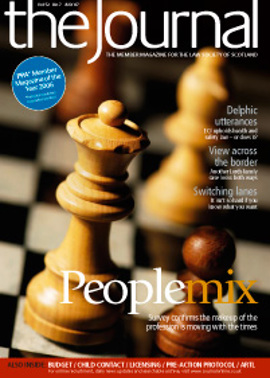Time (to prepare) please!

Who will be applying?
What do licence holders need to know, to comply with the new law?
They must be aware that they will have to apply for a new licence for their premises and also a personal licence for the person who will become the premises manager. They have to decide whether they want other employees having managerial responsibility for the premises to hold personal licences, to ensure they are aware of the law and other matters relating to the running of licensed businesses, and who can – should the premises manager leave – be substituted for the original premises manager.
Everyone who becomes a personal licence holder will need to be qualified and will need to have a virtually clean criminal record. There will be specific crimes detailed in the near future, convictions for which will mean that the person cannot be a personal licence holder. BII Scotland are preparing qualifications for all persons involved in the new regime.
The premises licence application will have to be made to the board in which the premises are to be found, and the personal licence application to the board where the applicant normally resides. These are not necessarily the same.
Starting over again
There are no grandfather rights – this means that current licence holders will not be guaranteed to get a premises licence at all, even if they have run their premises without any problems for the last 100 years. The hours they operate are not guaranteed, nor can they be sure they will be able to continue holding events or activities in the future which they have carried on successfully until now.
Licensing boards will be able to refuse applications on all statutory grounds (except for overprovision, if the application reflects the current business which takes place on the premises). If a licensee decides to introduce dancing where before they had carpet auctions, they will require to apply for a new licence and possibly be subject to refusal on the grounds of overprovision. Boards have no knowledge as to what occurs on licensed premises at present, so I would advise licensing lawyers to ask their clients to keep a diary and log all activities and the hours during which they take place, and the general opening and closing hours of the premises, to enable them to have a starting point for making the application.
Advise clients to take note of the following. If they hold karaoke, art auctions, weddings, conferences, sports facilities, dances, quiz nights etc etc, all of these will have to be detailed on their application form, giving the nature of the activity and possibly the days and times on which it will take place. This latter may be required at the discretion of the local board, so it will be necessary to check the board’s policy. If activities which may take place on the premises in the future are not the activities permitted by the licensing board, the client will be in breach of the operating plan and may be subjected to a licence review.
Calling time
Instead of having permitted hours during which all on-sales premises can trade, as with the present 11 am-11 pm Monday-Saturday and 12.30-2.30 pm and 6.30-11 pm on Sunday, and regular extensions to cover, e.g. later evening opening and Sunday afternoons, each application will have to state the hours during which the applicant intends to sell alcohol for on-sale and off-sale, and hold other activities. These hours will not necessarily be the same. On-sale hours can be virtually any period of time, being less than 24 hours, during which drink is served for consumption on the premises. Off-sale hours will be constrained between the hours of 10 am and 10 pm, even where your client can currently can sell off-sales from a pub or hotel during permitted hours. Off-sale hours are also subject to board approval.
Activities hours give boards a new power, which is to determine the actual opening hours of the premises – so someone who runs a village newsagent and grocer will require to state hours, for example as follows: off-sale hours 10 am-10pm; open for the sale of newspapers and groceries 6 am-11pm.
In addition to the above, applicants will need to have new plans drawn up of the premises. These will be the subject of regulation.
Rules for children
They will also require to consider whether or not they would like young persons 16 or 17 years old, and/or children (from birth to 15 years old), to be able to come onto their premises. This is very different to the current position where licensees can permit children and young persons under 18 entry to any part of the premises but the bar areas, and public house and hotel licence holders can apply for children’s certificates to permit children under 14 to be in the bar areas for the purposes of having a meal providing the premises are a suitable environment for children.
Under the new legislation all persons running on-sale premises will require to consider whether they want to have young persons/children on the premises at all; and if they do, where, when and under what terms. If they run a hotel, they will have to remember to let children into the bedrooms and other areas where they do not serve alcohol, even if they don’t want them in the bar.
THE NEW LAW: TOP 10 POINTS
Test purchasing
1. Ensure licensees and staff are properly trained NOT to serve persons under 18. Take the Scottish Licensees’ Certificate (managers and senior staff) and the Scottish Award in Responsible Alcohol Retailing (staff).
2. Adopt Challenge 21 to ensure that all young persons are challenged concerning their ages. CAN’T TELL – DON’T SELL.
3. Why? Failure to prevent sale to under 18s in a test purchasing situation will result in loss of licence and prosecution. This will very likely affect applicants’ business chances of becoming licensed in the new regime.
Applications under the new law
1. Every premises in Scotland will require to be licensed in the new regime. Applications will need to be in the hands of licensing boards as follows:
- For all licences terminating in March – 1 March 2008
- For all licences terminating in June – 1 June 2008
- For all licences terminating in October – 1 October 2008
- For all licences terminating in January – 12 January 2009
- Clubs will be advised by boards when they will be expected to enter the new regime.
- If applicants are late with their application, they will have to apply as of new.
2. There are no real grandfather rights. However if applicants apply on time, their application will not be able to be refused on grounds of overprovision and applicants will not have to produce local authority consents.
3. Applicants should start to keep a diary of hours they operate and activities which take place on the premises.
4. An applicant’s new licence will permit certain hours for the sale of alcohol and hours for the undertaking of activities.
5. Applicants will need to prepare plans of the entire premises.
6. Applicants will need to determine where, when and on what terms they wish children and young persons to be able to access their whole premises (not just bars as at present).
7. Applicants will have to apply for a personal licence – applicants will require to be properly trained and have no relevant or foreign convictions to be successful.
In this issue
- The power of marks: Frankie goes after Hollys name
- Confidentiality clauses - beware!
- Into the fast lane
- All change please...!
- Benchmark for practice
- Old, new, borrowed and blue
- Old, new, borrowed and blue (1)
- The Oracle has spoken
- High road, low road
- Point of contact
- Stuck in a rut?
- Counsel's fees - a reply
- Fraud: no hiding place
- A chance to shine
- CDD is the new ID
- System integrity
- Professional negligence: Pre-Action Protocol
- Not just a fancy name
- More on "enough is enough"
- Are you up to the Act?
- Saving energy - and effort
- Takeover goals
- Expensive consequences
- Expensive consequences (1)
- Scottish Solicitors' Discipline Tribunal
- Website reviews
- Book reviews
- Time (to prepare) please!
- ARTL - now and then?






